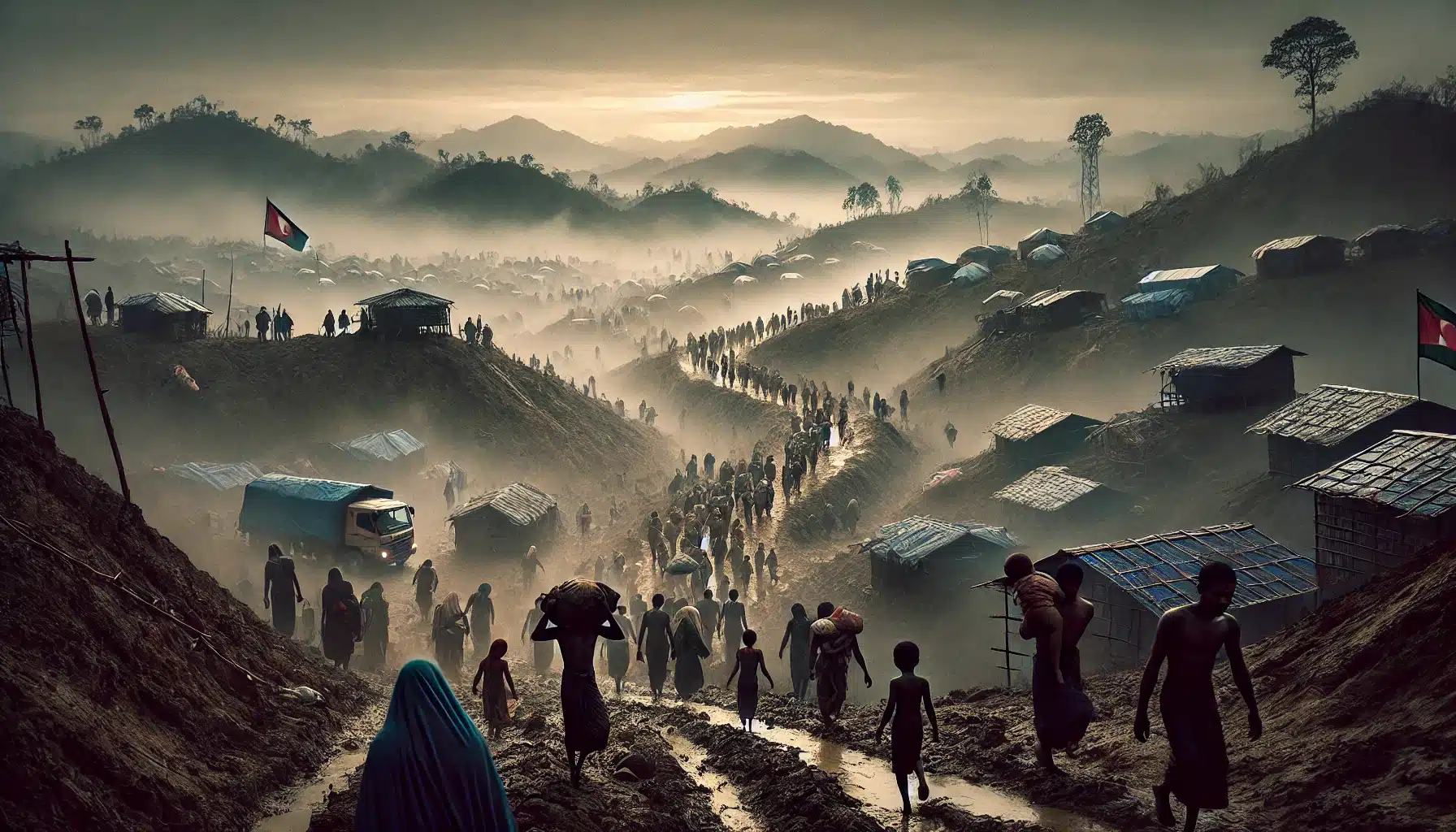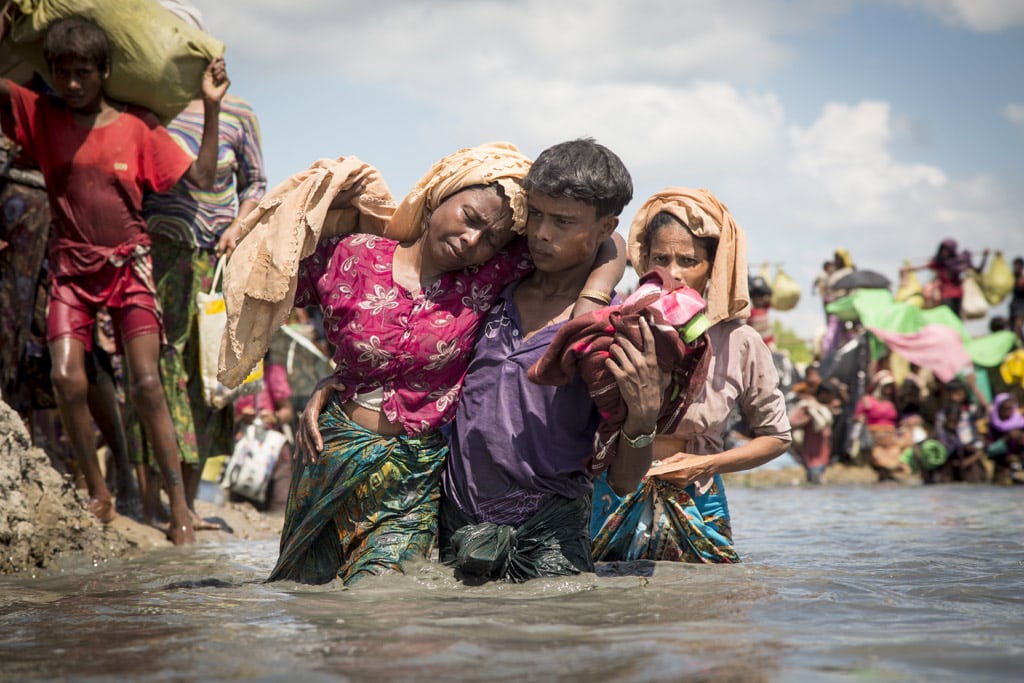Five years after Myanmar’s military launched a violent campaign of genocide and crimes against humanity, the Rohingya Muslims continue to suffer without justice. Over 730,000 have fled to Bangladesh, while 600,000 remain in Myanmar under harsh repression. No one has been held accountable for the atr

Automated compliance and legal drafting
The Rohingya Muslims continue to await justice and the protection of their rights, over five years since the Myanmar military began a violent and wide-scale offensive in northern Rakhine State. The campaign, marked by massacres, rapes, and arson, began on August 25, 2017, leading to over 730,000 Rohingya fleeing to Bangladesh, where they live in dangerous and flood-prone camps. About 600,000 Rohingya remain in Myanmar, enduring severe repression. Despite widespread atrocities that constitute crimes against humanity and genocide, no military officials have been held accountable. This ongoing injustice calls for immediate and concerted international action to ensure justice and safety for the Rohingya across Bangladesh, Myanmar, and the broader region.

Source: Rohingya refugees – Ceylon Independent
Human Rights Watch’s Call for Accountability:
- Human Rights Watch urged the global community to mark the five-year anniversary of the military campaign by devising an international strategy for accountability and justice.
- The strategy should focus on input from the Rohingya and ensure that their voices are central to the efforts.
Elaine Pearson, acting Asia director at Human Rights Watch, emphasized, “Governments should mark the five-year anniversary of the devastating campaign against the Rohingya with a coordinated international strategy for accountability and justice that draws on Rohingya input.”
- Pearson also urged international donors to help the Rohingya refugees gain access to education and employment, ensuring they can build independent and self-reliant futures.
Atrocities and Escape to Bangladesh:
- Since August 2017, Human Rights Watch interviewed hundreds of Rohingya in Bangladesh, who recounted their harrowing experiences.
- Myanmar soldiers were reported to have systematically killed, raped villagers, and burned homes. Thousands of Rohingya were killed, and nearly 400 villages were destroyed.
- The Rohingya refugees in Bangladesh joined hundreds of thousands who had fled previous waves of violence and persecution.
Abdul Halim, a 30-year-old Rohingya refugee in Bangladesh, described the military’s brutality: “Myanmar authorities brutalized us. They burned down our houses, raped our mothers and sisters, burned our children. We took shelter in Bangladesh to escape that brutality.”
- Abdul Halim carried his sick mother to safety, but she passed away shortly after arriving in Bangladesh.
Oppression of Rohingya in Myanmar:
- Those Rohingya who remain in Rakhine State face systematic abuses akin to the crimes against humanity of apartheid, persecution, and deprivation of liberty.
- They are confined to camps and villages, stripped of freedom of movement, and denied access to food, health care, education, and livelihoods.
Abdul Halim reflected on his experiences in Myanmar, stating: “Since we were children in Myanmar, we never had any freedom. They called me ‘nowa kalar’ [a derogatory term for Muslims], to say we are like animals.”
Statelessness and Discrimination:
- The Rohingya continue to be denied citizenship under the 1982 Myanmar Citizenship Law, leaving them stateless.
- The atrocities of 2017 were rooted in decades of state repression, discrimination, and violence.
- Hasina Hatu, a 40-year-old Rohingya, described the relentless persecution, saying, “In Myanmar, we struggled through life. When we raised goats, the border guard forces took away the goats. When we raised cattle, they took away the cattle. When we farmed paddy fields, they took away the rice.”
- Hasina’s father died as they fled Myanmar in 2017, falling down a muddy slope.
Post-2017 Coup and Renewed Military Operations:
- In February 2021, the generals who orchestrated the 2017 atrocities staged a coup, detaining Myanmar’s civilian leaders and unleashing a campaign of mass killings, torture, and indiscriminate attacks across the country.
- Military units, involved in the 2017 violence, were redeployed across the country for renewed operations.
- The junta’s control led to further restrictions on Rohingya camps and villages, exacerbating food shortages, water scarcity, disease, and malnutrition.
- Since the coup, security forces arrested an estimated 2,000 Rohingya, hundreds of them children, for “unauthorized travel,” sentencing many to up to five years in prison.
Challenges in Bangladesh:
- Over one million Rohingya refugees now live in sprawling camps in Cox’s Bazar and on the isolated Bhasan Char island in Bangladesh.
- Recently, Bangladesh authorities have heightened restrictions on livelihoods, movement, and education, making the refugees feel increasingly unwelcome.
Abdul Halim lamented, “If our children can’t be educated here in Bangladesh either, then anywhere we go, we will still be persecuted.”
- Around 28,000 Rohingya have been relocated to Bhasan Char, facing movement restrictions, shortages of food and medicine, and abuses by security forces.
Hasina Hatu voiced the frustration of many, asking, “How long will we live like this? I don’t think the world will solve our condition.”
International Response and Need for Repatriation:
- Global funding for the 2022 Joint Response Plan has only met a quarter of the $881 million needed for the humanitarian crisis.
- Efforts to repatriate the Rohingya back to Myanmar have so far failed due to ongoing persecution and abuse.
- Mohammad Ayaz, a 21-year-old Rohingya, expressed his desire for justice: “We want to go back to Myanmar but to go there we want justice.”
- Bangladesh and Myanmar have resumed discussions on repatriation, but conditions remain unsafe for Rohingya to return.
Call for International Action:
- Human Rights Watch called for a global arms embargo and sanctions targeting the Myanmar junta, including cutting off gas revenues.
- ASEAN was urged to abandon its failed five-point consensus and adopt stronger measures against the junta’s abuses.
- A US diplomat remarked at a UN Security Council meeting, “The longer we delay, the more people die. This council is failing in our collective responsibility to safeguard international peace and security. And it is failing the people of Burma.”
- Governments worldwide are encouraged to support the genocide case brought by Gambia against Myanmar at the International Court of Justice and pursue further investigations under universal jurisdiction.
Abdul Halim remained hopeful, stating, “We hope that, with help from foreign governments and Bangladesh, we will be able to get back our rights. That is what we want.”
Sources: Human rights watch





